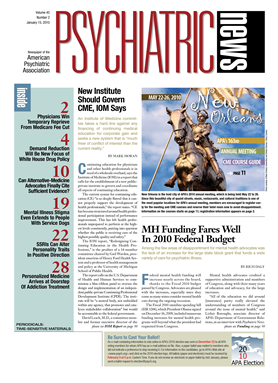Besides countering depression, the SSRI antidepressants may be capable of producing subtle changes in the personality traits of neuroticism and extraversion.
This finding comes from a study reported in the December 2009 Archives of General Psychiatry. The lead investigator was Tony Tang, Ph.D., of Northwestern University.
Tang and his colleagues gave 180 subjects with major depression either an SSRI antidepressant or a placebo for eight weeks. Each subject was evaluated for depression as well as two personality traits—neuroticism and extroversion—both at the start of the study and at the end of the eight weeks.
Both the SSRI group and the placebo group experienced a significant reduction in depression during the study period. In fact, the placebo group achieved a reduction in depression equal to 75 percent of that achieved by the SSRI group.
However, the placebo group experienced little change in either neuroticism or extroversion, whereas the SSRI group did show such a change. The SSRI group incurred reductions in neuroticism and increases in extroversion that were four to eight times larger than those shown by the placebo group. And when the depression improvement sustained by each group was considered, the SSRI group still incurred significantly greater decreases in neuroticism and increases in extraversion than the placebo group did.
Thus, the researchers noted, “patients with major depressive disorder reported substantial personality change during SSRI treatment. Such personality change was not dependent on depression improvement.”
“This study, which found that the SSRIs could subtly alter behavior in ways unrelated to direct improvement of depressed mood, and which builds upon work done by our group and others, was well done and statistically sophisticated,” Victor Reus, M.D., a professor of psychiatry at the University of California, San Francisco, told Psychiatric News. In a study published in the March 1998 American Journal of Psychiatry, Reus and colleagues reported that relative to a placebo, the SSRIs could significantly reduce hostility and significantly increase social affiliation in psychiatrically healthy volunteers.
If the SSRIs can indeed reduce neuroticism and increase extraversion in addition to countering depression, the finding has interesting implications.
For example, even if the SSRIs' ability to reduce neuroticism does not contribute directly to their ability to combat depression, such a reduction might prevent depression relapse, Tang and his colleagues suggested. The reason they think that this might be the case is that they found that subjects who experienced the greatest neuroticism reduction during treatment were also the most resistant to relapse during follow-up.
Reus, in contrast, believes that the findings “raise the prospect that traditional antidepressant trials might be conducted much more efficiently if measures of extraversion and neuroticism are used as the designated outcome variables in place of the traditional Hamilton Depression Scale. Such a change could markedly decrease ‘false positives,’ that is, placebo responders, and lead to a much greater effect size for therapeutic benefit that was ascribable to these drugs. Trials could be done with fewer subjects, at less cost, and result in more rapid approval of newer agents.”
The study was funded by the National Institute of Mental Health.

